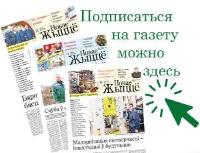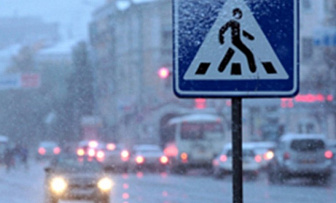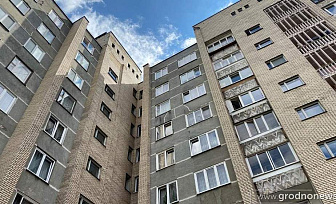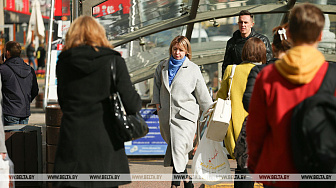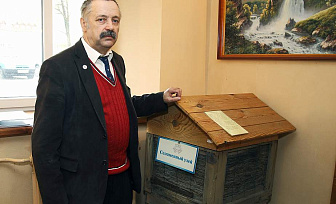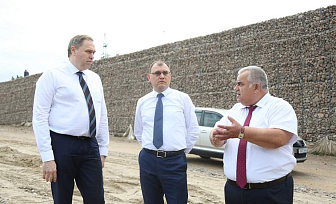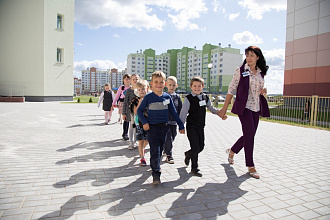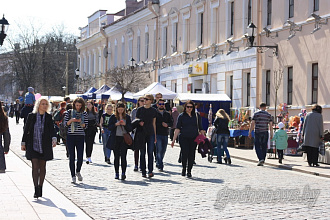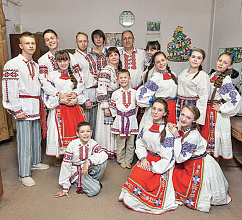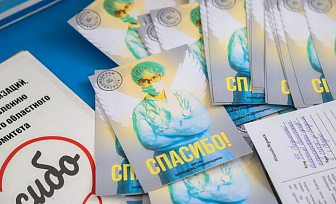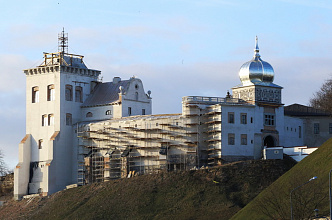The Bielski’s partisan group has a special place in the history of Belarusian partisan movement. The Bielski brothers led a group of partisans responsible for saving more than 1,200 Jews during the Holocaust. Every year more and more descendants of the former partisans from the Bielski group came to Novogrudok. The Bielskis from St. Petersburg, Chernigov and Israel came to see our town in May this year. Their grandfather Zelig was Tuvia Bielski’s uncle, his father David Bielski’s brother.
The Bielski partisan group is the largest partisan group in the Soviet Union and all of German- occupied territory. It was founded by Asael, Tuvia, and Zus Bielski in summer 1942. In June 1943 Tuvia Bielski's group grew to over 750 people. The Bielski’s forest camp was like a town. There were a few dozens of dugouts. The camp included a school for children, a clinic, a law court, and a synagogue. It also included numerous workshops, including a machine shop to repair weapons and a tannery. According to the Archives, the Bielski fighters carried out 38 combat missions, destroying 2 locomotives, 23 train cars, 32 telegraph poles, and 4 bridges.] In total, the Bielski partisans claimed during the war to have killed 260 enemy fighters.
The Bielski Brothers
Before the war David and Zelig Bielski had big families. David had 12 children, Zelig had 7 children from the first marriage and 3 children from the second. Zelig’s first wife Shifra Izraelit died from typhus when his younger son Yudel was 9. David was the owner of a mill in the village of Stankevich and Zelig lived in 36, Korelichi Street in Novogrudok. He was a glazier. In the 20s of the XIXth century many Novogrudok citizens went abroad in search of greener pastures. David’s son and 3 Zelig’s eldest sons left for America.
[caption id="attachment_73832" align="alignnone" width="800"]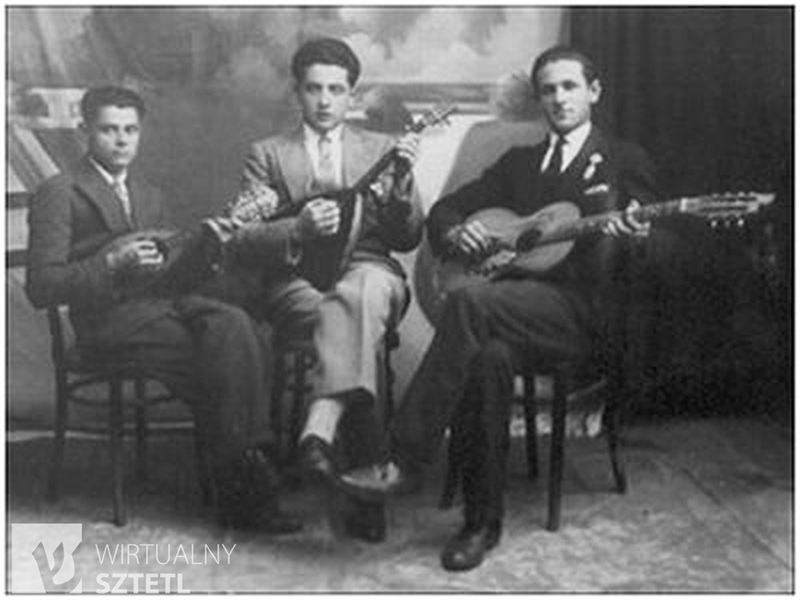 Yudel Bielski - one on the extreme right. The photo contributed by Leslie Bell[/caption]
Yudel Bielski - one on the extreme right. The photo contributed by Leslie Bell[/caption]
Yudel was Zelig’s eldest son who stayed in Novogrudok. He graduated from Tarbut school. The word Tarbut means "Culture" in Hebrew. The Tarbut movement was a network of secular, Hebrew-language schools. Except the Hebrew and Yiddish languages which were spoken in Jewish families, Yudel knew Russian and Polish. He could play the violin and guitar, was an athlete and a good dancer.
David’s son Tuvia Bielski and his cousin Yudel were in the Polish army. Tuvia completed his military service in 1937, returned home, got married and left for the village Subbotniki and then for Lida.
When Germany invaded Poland in September 1939 Yudel was still in the Polish Army. He was injured and sent to hospital in Warsaw. When the Schutzstaffel (SS) came to hospital in search of polish officers and Jews, he had to escape as he was both A Jew and an officer. A nurse helped him to escape. Yudel came to Novogrudok, built the house and worked as a barber in his wife’s barbershop.
“We are not going to surrender”
In June 1941 the war came to Novogrudok. In November David Bielski and his wife Bella were taken to Novogrudok. They and their sons lost their lives during the first year of German occupation. Zelig, his wife, his 3 daughters, 2 sons-in-law and 5 grandchildren were shot in Skrydlevo on December 8, 1941. Only Tuvia and his brothers survived. During the first winter of occupation they were hiding at their friends’, going from one village to another. They often spent the night either in the forest or in the corn-floor. When it got warm they built their first dugout in the forest between the villages of Stankevich and Small Izva. It was June of 1942. There were 20 of them - The Bielski Family.
Yodel and his wife were in the ghetto in Peresietskaya Street. Shortly before the shooting on August 7, 1942, when about 4,000 people from the ghetto were shot at Lake Litovka, Yudel had got a message from his cousin Tuvia.
His friend Kostya Kozlovsky from the village of Mokrets brought the message. Tuvia wrote, “We are hiding in the forest and we are not going to surrender to the Germans. Come with your wife and a couple of good guys and we can work something out. Don’t hesitate, please. Hope to see you soon in the forest.”
Yudel, his wife and 8 selected young guys escaped from ghetto and fled into the woods where they met Tuvia, Asael and Zus Bielski.
Bielski “Refined”
As the murders and torture of the Jews increased in the Novogrodek ghetto and elsewhere, Tuvia decided to expand the group beyond their relatives. Thus the Bielski family group became a partisan group. Firstly it was called Zhukov’s group. Military service experience helped Yudel. He was managed to get into the ghetto many times and lead prisoners into the forest. When Sonya Bolda came into the forest Zus wanted to marry her. Sonya’s requirement was to release her parents from the ghetto. So Yudel went to ghetto and in a few days Sonya’s parents were in the Bielski group.
Although it was hard to live in the forest, even there Yudel managed to stay a man of the city. Because of Yudel’s way of behaving, his battle friends called him Bielski Refined (in Yiddish – cydl). Yudel introduced partisans a word malbush (useless). The word was for those who were unused to the forests and didn’t know know the way around a horse or how to handle a gun. He himself was very brave and decisive. Once his friend was wounded into the head and Yudel did the surgery and saved his life. His friend could live up to 87 years.
Scattered by fate throughout the world
[caption id="attachment_73830" align="alignnone" width="300"]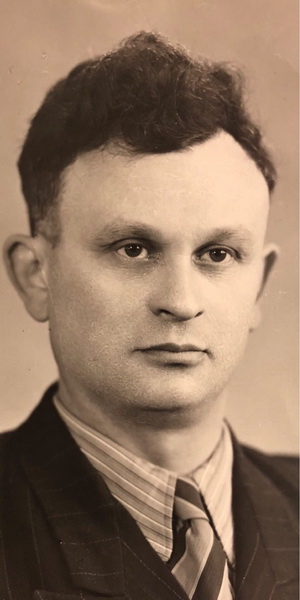 Samuel Bielski[/caption]
Samuel Bielski[/caption]
The fate of Samuel, Yudel’s stepbrother, followed a different course. In June 24 when the Germans bombed Novogrudok, his father Zelig ordered him to flee the town. Samuel and his friend went on bikes following the retreating Red Army. Then they went by trains and arrived in Russia. There he was called into the Navy service. In 1944 Samuel got typhoid and was in hospital in Tashkent. He was considered to be a hopeless case and was put with the corpses. At night Samuel regained consciousness, realized that he was among the corpses and was able to leave the hospital. He was found by nurses and taken back into the hospital. The war was over. Samuel got married and settled in Chernigov. He built the house where his grandson Yury Pinsky lived today. It was Yury who organized the visit of his parents, his aunt from Izrael and uncle from St.Petersburg to Novogrudok. Yury came to Novogrudok with his wife and two kids.
Zinovy Bielski from St. Petersburg is a singer and composer of his own songs in Russian chanson genre. Before becoming a singer and composer he was a tuner of musical instruments and musical instruments factory manager. After the USSR's collapse he started his own business in selling accessories for clothing industry. He knew nothing about thread and buttons when he started but succeeded.
[caption id="attachment_73834" align="alignnone" width="298"]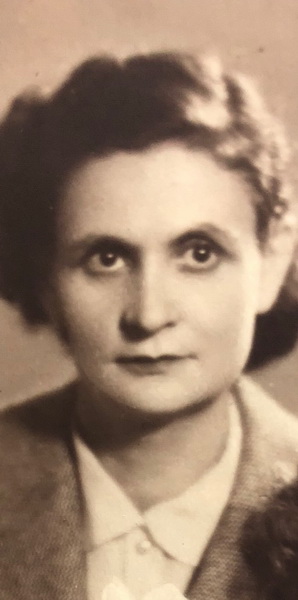 Zelda Bielski[/caption]
Zelda Bielski[/caption]
Zinaida (Zelda) Bielski’s family in Australia heard about the Bielskis’ visit in Novogrudok. Zelda was a former partisan of the Bielski group and Yudel’s step-sister and Tuvia’s cousin. When Yudel escaped from ghetto and fled into the woods she decided to do the same. Her husband refused to go with her but that fact didn’t stop her. In October 1942 Zelda together with other ghetto prisoners had to go to work in town. She was the last in a convoy of a few hundred meters. Before leaving the ghetto Zelda put on a mat in order to hide her yellow badge. Zelda’s plan was to get behind the convoy and escape. In spite of the fact that a Hilfspolizei noticed this he let her escape. So she found the Bielski group. Her husband Lazar joined the Bielski group later but he was among the ten partisans who was killed at Bielous’ hamlet. After the war Zelda became mother of 3 daughters and moved to Australia.
“Don’t rush to fight and die. So few of us are left, we need to save lives. It is more important to save Jews than to kill Germans.” © Tuvia Bielski
[caption id="attachment_73831" align="alignnone" width="431"]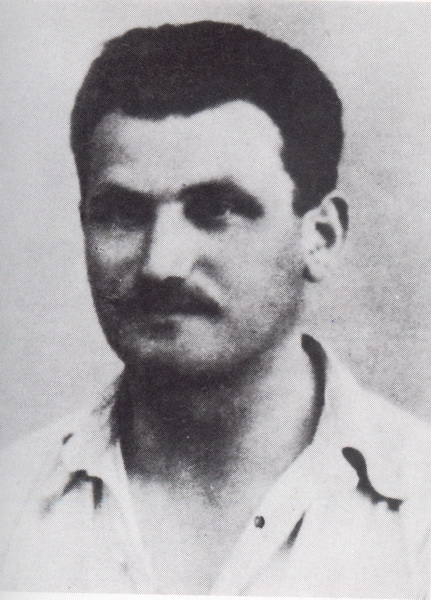 Tuvia Bielski[/caption]
Tuvia Bielski[/caption]
In July 1943 the Germans sent 52,000 soldiers to the forest to launch an extensive hunt and to liquidate all partisans in the forest. The Bielski group left, abandoning everything they had collected over the last months. They decided to move to the Naliboki Puscha, a forest filled with swampland. The Bielski brothers led the approximately 800 members through miles of swamps to an isolated island, called Krasnaya Gorka, in the center of the forest. Tuvia was checking and cheering up the convoy all the time. He said, “Children, when this is all over, we’ll go to the cinema to see the movie about this.” David’s mother Rivka Sanderovska remembered Tuvia that way. She and her 64-year-old mother came to Bielski group in November 1942.
Today there are more than 25,000 descendants of the Bielski partisans. Next year we will celebrate the 75th anniversary of the daring escape of 223 prisoners from the local ghetto. It is a good reason for getting all together.
By Tamara Vershitskaya, research worker, curator of the Museum of Jewish Resistance in Novogrudok
Translated by Helen Chal




